
King Arthur is a legendary king of Britain, and a central figure in the medieval literary tradition known as the Matter of Britain. In Welsh sources, Arthur is portrayed as a leader of the post-Roman Britons in battles against Anglo-Saxon invaders of Britain in the late 5th and early 6th centuries. He first appears in two early medieval historical sources, the Annales Cambriae and the Historia Brittonum, but these date to 300 years after he is supposed to have lived, and most historians who study the period do not consider him a historical figure. His name also occurs in early Welsh poetic sources such as Y Gododdin. The character developed through Welsh mythology, appearing either as a great warrior defending Britain from human and supernatural enemies or as a magical figure of folklore, sometimes associated with the Welsh otherworld Annwn.
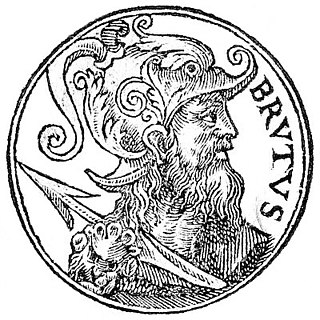
Brutus, also called Brute of Troy, is a legendary descendant of the Trojan hero Aeneas, known in medieval British legend as the eponymous founder and first king of Britain. This legend first appears in the Historia Brittonum, an anonymous 9th-century historical compilation to which commentary was added by Nennius, but is best known from the account given by the 12th-century chronicler Geoffrey of Monmouth in his Historia Regum Britanniae.

Corineus, in medieval British legend, was a prodigious warrior, a fighter of giants, and the eponymous founder of Cornwall.
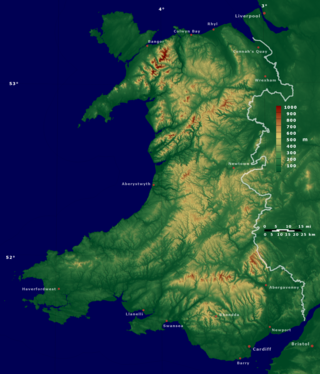
Cambria is a name for Wales, being the Latinised form of the Welsh name for the country, Cymru. The term was not in use during the Roman or the early medieval period. After the Anglo-Saxon settlement of much of Britain, a territorial distinction developed between the new Anglo-Saxon kingdoms and the remaining Celtic British kingdoms. Latin being the primary language of scholarship in Western Christendom, medieval writers commonly used either the older term Britannia, as the territory still inhabited by Britons, or Wallia, a term derived from Old English, to refer to Wales. The term Cambria is first attested in Geoffrey of Monmouth in the 12th century as an alternative to both of these, since Britannia was now ambiguous and Wallia a foreign import, but remained rare until late in the Middle Ages.

The Matter of Britain is the body of medieval literature and legendary material associated with Great Britain and Brittany and the legendary kings and heroes associated with it, particularly King Arthur. It was one of the three great Western story cycles recalled repeatedly in medieval literature, together with the Matter of France, which concerned the legends of Charlemagne, and the Matter of Rome, which included material derived from or inspired by classical mythology.

Locrine is an Elizabethan play depicting the legendary Trojan founders of the nation of England and of Troynovant (London). The play presents a cluster of complex and unresolved problems for scholars of English Renaissance theatre.

Locrinus was a legendary king of the Britons, as recounted by the 12th-century chronicler Geoffrey of Monmouth in his Historia Regum Britanniae.
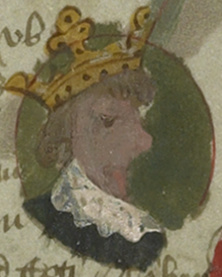
Camber, also Kamber, was the legendary first king of Cambria, according to the Geoffrey of Monmouth in the first part of his influential 12th-century pseudohistory Historia Regum Britanniae. According to Geoffrey, Cambria, the classical name for Wales, was named for him.
Humber the Hun was a legendary king of so-called "Huns" who, according to Gafridian legend, invaded the British Isles in about the 12th century BC. His people successfully conquered Scotia but he himself was drowned during his campaign against Southern Britain.
Estrildis was the beloved mistress of King Locrinus of the Britons and the mother of his daughter Habren, according to the 12th-century chronicler Geoffrey of Monmouth.
Queen Gwendolen, also known as Gwendolin, or Gwendolyn was a legendary ruler of ancient Britain. She is said to have been queen during the 11th century BC.
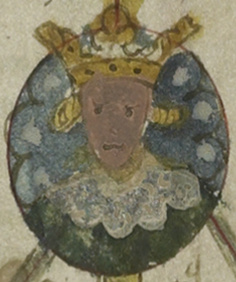
Ebraucus was a legendary king of the Britons, as recounted by Geoffrey of Monmouth. He was the son of King Mempricius before he abandoned the family.
Cunedagius was a legendary king of the Britons, as recounted by Geoffrey of Monmouth. He was the son of Henwinus, Duke of Cornwall, and Regan, the daughter of King Leir.

Historia regum Britanniae, originally called De gestis Britonum, is a pseudohistorical account of British history, written around 1136 by Geoffrey of Monmouth. It chronicles the lives of the kings of the Britons over the course of two thousand years, beginning with the Trojans founding the British nation and continuing until the Anglo-Saxons assumed control of much of Britain around the 7th century. It is one of the central pieces of the Matter of Britain.
Logres is King Arthur's realm in the Matter of Britain. It derives from the medieval Welsh word Lloegyr, a name of uncertain origin referring to South and Eastern England.
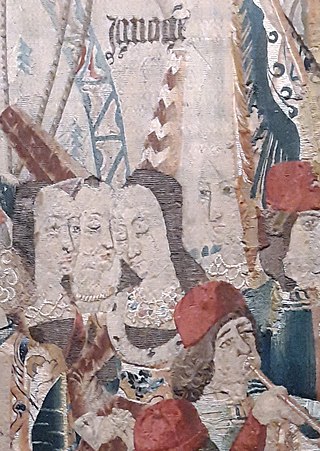
Innogen is a character in the Historia Regum Britanniae and subsequent medieval British pseudo-history. She was said to have been a Greek princess, the daughter of King Pandrasus, and to have become Britain's first Queen consort as the wife of Brutus of Troy, the purported first king of Britain who was said to have lived around the 12th century BC. Her sons Locrinus, Camber, and Albanactus went on to rule Loegria, Cambria, and Alba respectively.

Hafren is a legendary British princess who was drowned in the River Severn by her repudiated stepmother Gwendolen. The legend appears in Geoffrey of Monmouth's pseudohistorical chronicle Historia Regum Britanniae. According to Geoffrey, Hafren is the eponym of the Severn, which bears one of Britain's most ancient river names.

Lloegyr is the medieval Welsh name for a region of Britain (Prydain). The exact borders are unknown, but some modern scholars hypothesize it ran south and east of a line extending from the Humber Estuary to the Severn Estuary, exclusive of Cornwall and Devon. The people of Lloegyr were called Lloegyrwys without distinction of ethnicity, the term applying to both Britons and Anglo-Saxons.
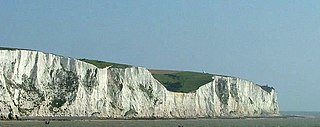
Albion is an alternative name for Great Britain. The oldest attestation of the toponym comes from the Greek language. It is sometimes used poetically and generally to refer to the island, but is less common than 'Britain' today. The name for Scotland in most of the Celtic languages is related to Albion: Alba in Scottish Gaelic, Albain in Irish, Nalbin in Manx and Alban in Welsh and Cornish. These names were later Latinised as Albania and Anglicised as Albany, which were once alternative names for Scotland.















